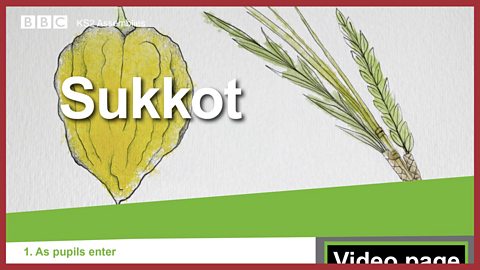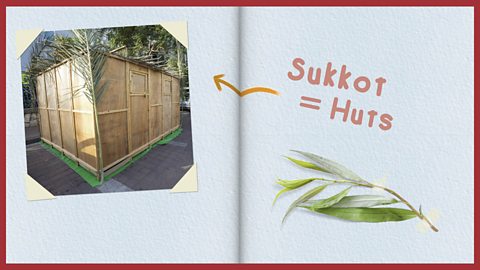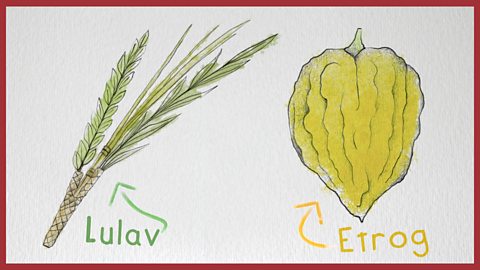School Radio > Assemblies > Sukkot
SMSC - Festivals - Calendar - Philosophical - Treasure Champs - Songs
In short...
Themes: Celebrating the festivals of world religions; Sukkot; Moses and the Exodus; giving thanks.
Summary: This assembly celebrates the Jewish festival of Sukkot. The festival lasts for 1 week (technically 8 days in countries other than Israel) and in 2024 it begins on the evening of 16 October. Sukkot is a harvest festival but also remembers the Exodus, when Moses led his people out of slavery in Egypt. The video and other materials can also be used as part of a broader study of Judaism or the important festivals of world religions.
Resources: The framework to download / print (pdf), an illustration including a sukkah and an illustration of an etrog and lulav.

The video
It’s Sukkot!
Sukkot is an important celebration for Jewish people all around the world, including here in Israel!
It’s the Jewish Harvest festival - a time to give thanks and remind ourselves of the importance of our faith. It lasts for a whole week!
Sukkot means ‘huts’. Every year in autumn, Jews all over the world prepare for Sukkot by building and decorating their own special hut - called a sukkah. Every sukkah is different. But they must have at least three walls, a roof made of branches and leaves, called s'cach, and mustn't be covered by anything else.
During the week of Sukkot, the sukkah becomes a part of our home. We eat all our meals there. Some people even sleep in their sukkah!
But why do we do these things?
Well…we build a sukkah to remind us of our ancient Jewish ancestors, who escaped from slavery in Egypt and spent 40 years wandering the desert in search of the special land we believe God had promised to them.
They couldn’t build houses, so they lived in temporary shelters, which weren’t very strong. Without sturdy walls for safety, they had to rely on God to protect them from danger.
So today, we spend time in our sukkah during Sukkot to honour our ancestors, and remind ourselves of God’s security and protection. And we leave holes in the roof so we can see God’s light!
The first few days of Sukkot are called Yom Tov. That means ‘festival day’! Yom tov is one day for Jews who live in Israel and two days for Jews who live in other countries. On Yom Tov work is forbidden, and in the evening we light candles, recite prayers, and have a big meal with our families!
During the week, we spend time in our sukkah. Recite special prayers of thanksgiving to God, worship at the synagogue, and sing and dance with our friends and family!
But my favourite part of Sukkot is the taking of the Four species!
The four species are an etrog - a fruit that’s a bit like a big lemon - and a collection of branches from palm, myrtle, and willow trees - called a lulav.
On each day of the festival after Yom Tov we take the Four species, recite a blessing over them, and wave them in six directions. This symbolises unity and reminds us that God is everywhere!
The last day of Sukkot is called Hoshanah Rabbah. On this day, we believe God decides our fate for the next year. There’s a special service at the synagogue, where we pray and circle the room seven times, to show gratitude for a blessed and fruitful year ahead.
At the end of the service, everybody strikes the ground five times with bundles of willows, which symbolises getting rid of sin.
Then, we go back to our sukkah for the final celebration of the festival - a big festive meal!
Sukkot is such a special time for my community! It helps us to appreciate the comforts we have and show thanks to God for his blessings.
Happy holiday! Chag Sameach!
The video is narrated by a young member of the Jewish community.
Sukkot is one of the festivals of celebrated by Jews around the world each year. The festival lasts for 1 week and gives thanks for a successful harvest. A key part of Sukkot is the sukkah - a temporary dwelling which each family constructs and in which they will spend time during the festival. The sukkah is a reminder of the Exodus and the dwellings made by Moses and his people during 40 years in the wilderness. During the festival meals are taken inside the sukkah and many people choose to sleep there as well.
Another important custom associated with Sukkot is the Four species. The four species are a fruit called an etrog and sticks of myrtle, palm and willow, called a lulav when bound together. During the festival these are waved in different directions in a ceremony that can be performed in the synagogue or at home.
The festival concludes with a special service at the synagogue and a celebratory meal for family and friends.
Duration: 4' 06"
Final words: '…for His blessings. Happy holiday! Chag Sameach!'
Video questions
- How long does Sukkot last? (1 week - actually 8 days in countries outside Israel)
- What is a sukkah? (A temporary dwelling that Jewish families construct for Sukkot)
- What is the significance of the sukkah? (It is a reminder of the time the Jewish people spent in the wilderness following escape from slavery in Egypt - the Exodus)
- What happens in the sukkah? (All meals are taken there; some people choose to sleep there also)
- What is special about the roof of the sukkah? (It must be made from plant material and nothing else)
- What is an etrog? (A citrus fruit)
- What is the bundle of myrtle, palm and willow called? (A lulav)
- What happens at the end of sukkot? (There is a special service in the synagogue, which includes striking the ground five times with a bundle of willow)

Key links
Assembly framework (pdf) document
Download / print the assembly framework ready for use

Image: a sukkah. image
Click to display the image full-size

Image: illustration of an etrog and lulav. image
Click to display the image full-size


Suggested framework
1. Entry
Play your chosen music and display the image showing a sukkah with the explanation 'Sukkot = Huts' if you wish.
2. Introduction
Tell the children that they will be finding out about the Jewish festival of Sukkot. Explain to the group that Sukkot has its origins among Jewish communities in Israel but is now celebrated by Jews all over the world, including in the UK. Ask the children to look out for the meanings behind the traditions of Sukkot.
3. The video
Play the video. The duration is 4' 06" and the final words are: '…for His blessings. Happy holiday! Chag Sameach!'
4. After the video - Time to talk
- Ask the children: Turn to the person next to you and tell them which part of the festival of Sukkot you would enjoy the most.
- Then lead a discussion about the video to help children consolidate their understanding of the festival and its significance:
1. Sukkot is a harvest festival and a time to give thanks. Can you remember how long the festival lasts? (1 week - technically 8 days in countries outside Israel).
2. During the festival, Jews build and decorate a basic hut called a sukkah. Who can tell me why Jewish people do this? (To remember their ancestors who wandered the desert and lived in temporary shelters, relying on God for protection). Wait for responses. Follow up with: What are some of the requirements for the construction of a sukkah? (At least three walls, a roof of branches and leaves, holes in the roof to see God’s light).
3. During Sukkot, Jewish families spend time in the sukkah, recite prayers, have big family meals, and sing and dance. But what other special things do they do? (Taking of the four species, beating willow branches on the ground). Wait for responses. Follow up with: Can you remember the significance of these activities? (For the four species: unity and a reminder that God is all around. For the willow branches: getting rid of sin).
4. Can anyone tell me what the main message of the festival of Sukkot? (To give thanks and remind Jews of their faith) Wait for responses. Follow up with: What lessons can Sukkot teach us, regardless of our own faith? (To appreciate and be grateful for our comforts).
5. Opportunity to sing
An opportunity to sing your chosen song. Suggestions from BBC collections below.
6. Opportunity for reflection
Focus your reflection on the core message of Sukkot - gratitude and appreciation for the comforts of our daily lives. Ask the children to sit quietly and think about the things they have around them that make life easy and comfortable, and consider that there are people around the world that don’t enjoy those same comforts. Spending time in a sukkah during Sukkot helps Jews appreciate the protection of God, and the festival can teach us all to be grateful for what we have.
7. Opportunity for prayer
Begin with your usual form of address ('Dear God', 'Dear Lord', 'Let us pray' etc) and:
Thank you for the lessons we can learn from the festival of Sukkot.
Help us to appreciate our daily comforts…
…and do what we can to help others less fortunate than ourselves.
Amen.

Suggested songs
'All together as a family' (All about our school, no 15).
Some can dance and some can sing,
Some can fiddle on a violin.
Some can bat and some can bowl,
Some can tackle and score a goal.
Some can paint and some can sew,
Some can juggle and some can throw.
Some can throw, some can throw.
All that we can do or be
All together as a family.
All together as a family.
All together as a family.
All together as a family.
Some can run and some can swim,
Some do somersaults in the gym.
Some can ride or climb a tree,
Some are good at technology.
Some can teach and some can guide,
Some get everybody organised.
Organised, organised.
All that we can do or be
All together as a family.
All together as a family.
One for all and all for one,
All together we get things done.
We get things done.
All that we can do or be…
spoken 1, 2, 3, 4, 5, 6, 7, 8
All together as a family.
Song: 'Give me oil in my lamp' (Come and Praise, no 43. Vocal version)
- Give me oil in my lamp, keep me burning.
Give me oil in my lamp, I pray.
Give me oil in my lamp, keep me burning,
Keep me burning till the break of day.
ChorusSing hosanna, sing hosanna,
Sing hosanna to the King of Kings!
Sing hosanna, sing hosanna,
Sing hosanna to the King!
- Give me joy in my heart, keep me singing.
Give me joy in my heart, I pray.
Give me joy in my heart, keep me singing,
Keep me singing till the break of day.
Chorus
- Give me love in my heart, keep me serving.
Give me love in my heart, I pray.
Give me love in my heart, keep me serving,
Keep me serving till the break of day.
Chorus
- Give me peace in my heart, keep me resting.
Give me peace in my heart, I pray.
Give me peace in my heart, keep me resting,
Keep me resting till the break of day.
Chorus
'God is watching over you' (All about our school, no 7)
God is watching over you,
When you lay down to sleep,
When you wake he will keep
Always watching over you,
Now and forever more.God is watching over you,
When you lay down to sleep,
When you wake he will keep
Always watching over you,
Now and forever more.
Now and forever more.

Related links
- BBC Bitesize: Sukkot
- A Jewish boy's Sukkot - from BBC RE KS3 and KS4: Challenging Faith and Exploring Beliefs

School Radio > Assemblies > Sukkot
SMSC - Festivals - Calendar - Philosophical - Treasure Champs - Songs